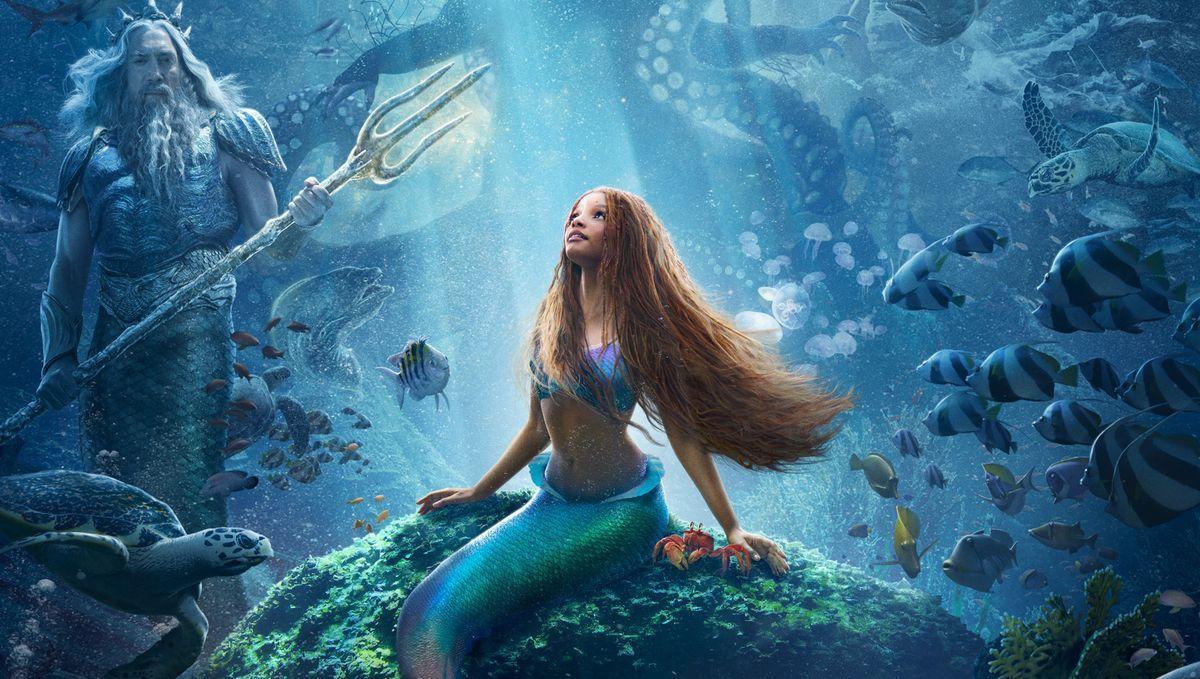“The Little Mermaid” avoids floundering in a sea of high expectations
“The Little Mermaid” is the latest animated classic to get caught in Disney’s live-action remake net.
The movie, directed by Rob Marshall, is a standout compared to other adaptations, capturing the charm of the animated film while adding a contemporary flair for modern audiences.
Largely, the film stays true to its roots, with the addition of visual depth, character development and musical numbers that combine to make it over 50 minutes longer than the 1989 film. This expansion felt unnecessary at times.
However, from a storytelling perspective, the movie was coherent and careful not to overextend itself. The moral of the story about staying true to oneself and finding one’s own path is clearly delivered for young audiences.
In deep exchanges with her father, King Triton, Ariel rebels against expectations placed upon her future. Portrayed with exceptional gravitas by Javier Bardem, King Triton serves as a formidable counterpart to Ariel’s defiance and furthers the tension in the plot.
Also enjoyable for young audiences were the vibrant and bright ocean scenes. Colors pop, life abounds and the camera-work is immersive — swerving and diving through reefs like a fish at times.
Dazzling blues, radiant corals, vibrant purples, sparkling greens and a variety of eye-catching sea creatures allow the creators to render a believable and bewitching ocean world.
The depth and clarity was surprising compared to garish Disney remakes of the past like “The Lion King” and “Beauty and the Beast.” This film was more reminiscent of “Avatar: The Way of Water,” a 2023 Oscar winner for Best Visual Effects.
The movement of Ariel’s hair, the way light refracted under the water and reflected across her shimmering scales was realistic and almost magical.
Speaking of Ariel, despite the wrongful controversy surrounding her casting, Halle Bailey rose to the challenge and gave an endearing performance. Bailey didn’t just portray Ariel — she became Ariel, embodying the spirit of voice actress Jodi Benson’s original portrayal in a sweet and memorable way.
For half of the runtime, Ariel is magically mute, making the role a challenge. Bailey’s voice was powerful, but at times without it her performance didn’t make a splash.
There’s a distinctive, expressive style to animation, and achieving the level of expression possible with a cartoon Ariel is certainly a daunting task — yet it was still a little disappointing when the live-action didn’t match up.
The villain of this tale, the sea witch Ursula, was *mostly* well played by comedic actor Melissa McCarthy.
Ursula’s appeal lies in her sinister humor and wicked charisma. But at times, McCarthy seemed to lose that evil mask for one-liners and humorous tirades, like her reaction to misplacing one of her important magical items, that were uncomfortably out of place.
Similarly, I would have liked facial expressions from McCarthy at a closer level to her animated counterpart. During certain scenes though, such as the “Poor Unfortunate Souls” song, Ursula was as dastardly as ever.
The malicious glee in her eyes, the sinister curl of her lips and her menacing gestures were captivating and grating in a way befitting of a villain.
Not every live-action conversion was regrettable. Jonah Hauer-King’s Prince Eric was given more depth than his animated counterpart. Part of the longer run time was devoted to giving the good-hearted Prince Eric personality and dreams, rather than just being reduced to a heroic prop.
The expanded role of Prince Eric involved scenes showing his love for the sea, his desire for adventure, and his growing curiosity and respect for the underwater world.
This development made the chemistry between Prince Eric and Ariel — filled with laughs, romantic tension and expression — that much more engaging and a major draw of the movie.
Music, a crucial complementing element of any Disney adaptation, had its highs and lows. Alan Menken delivers solid work as expected, harkening back to the original score in an improved manner.
Surprisingly, producer Lin-Manuel Miranda’s contributions didn’t quite hit the mark.
“Under the Sea,” an iconic number in the original, falls flat in a realistic world (where sea life don’t play musical instruments on cue).
Sebastian, played by Daveed Diggs and Scuttle, played by Awkwafina, were acceptable as comic relief. However, the Miranda-orchestrated rap scene they had, titled “Scuttlebutt,” was an unappreciated and jarring addition.
Regardless, the movie managed to strike a chord with the audience. In my showing, there was emphatic applause by the film’s close, a signal that the film may have managed to hit the same notes as the beloved original.
“The Little Mermaid” had its pitfalls: occasionally underwhelming performances, less than impactful musical numbers and a number of nitpicks for die-hard fans of the original. However, the chemistry between Ariel and Eric was electric, and the moral of the story imparted to young viewers is clear as ever.
Remakes can often put directors in an artistic bind with little wriggle room, but Marshall was able to navigate the fine line between nostalgia and a novel presentation that brings something new to the table.
Who wants to watch the same thing twice? It’s not a carbon copy of the animated classic, and that’s where its charm lies.


